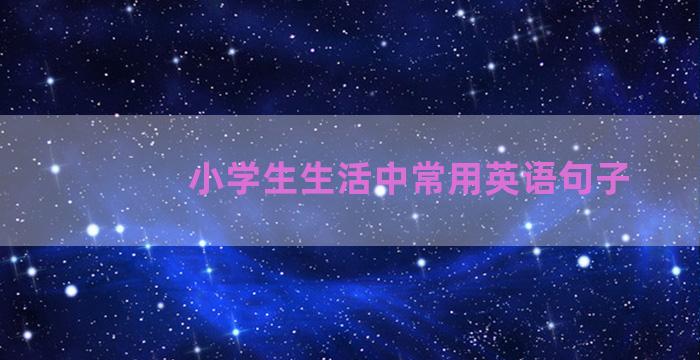
很多朋友对于小学生生活中常用英语句子和小学生生活中常用到的英语口语都有哪些不太懂,今天就由小编来为大家分享,希望可以帮助到大家,下面一块儿来看看吧!

本文目录
[One]、小学生生活中常用到的英语口语都有哪些
〖One〗、Good morning/afternoon/evening/night早上好/下午好/晚上好/晚安
〖Two〗、Good morning,mom.早晨好,妈妈。
〖Three〗、Nice to meet you. Glad to see you.见到你很高兴。
〖Four〗、--How are you?你好吗?--I’m fine, thank you.我很好,谢谢你。
〖Five〗、--May I come in?我能进来吗?--Come in please.请进。
〖Six〗、It's time to get up!/It's time to get out of bed.该起床了!
〖Seven〗、I don't wanna get up.我真不想起。
〖Eight〗、It's time to have breakfast.该吃早饭了。
〖Nine〗、Let’s go out.让我们一起出去玩吧。
〖Ten〗、Don't forget to take out the garbage.可别忘了扔垃圾!
1〖One〗、What’s yourname, please?你的名字是什么?
1〖Two〗、Your name, please?你叫什么名字?
1〖Three〗、Myname is…/ I’m…我的名字是…/我名叫…
1〖Four〗、ust call me Tom.就叫我汤姆吧。
1〖Five〗、This is Miss/ Mr/ Mrs…这位是…小姐/先生/女士。
1〖Six〗、This is my friend.这是我的朋友。
1〖Seven〗、If you don't hurry,we'll be late./Hurry up or we'll be late.你快点儿,我们该迟到了!
1〖Eight〗、Let’s have a rest.让我们休息一下。
1〖Nine〗、One by one,please.一个接一个。
20、Nice to meet/see you.很高兴认识/见到你。
2〖One〗、Sorry, I don’t know.对不起,我不知道。
2〖Two〗、Have some bananas, please.请吃些香蕉。
2〖Three〗、It’s time for the cakes.该吃些蛋糕了。
2〖Four〗、Let’s get some(red) flowers.让我们来摘些(红)花。
2〖Five〗、It might rain today.今天好像要下雨。
2〖Six〗、May I have yours?我能吃你的吗?
2〖Seven〗、Can I have two cakes?我能吃两个蛋糕吗?
2〖Eight〗、Can I have one,please?我能吃一个吗?
2〖Nine〗、Yes./All right. Here you are.好的。给你。
30、Can I go with you?我能和你一起走吗?
3〖One〗、Do you know her telephone number?你知道她的电话号码吗?
3〖Two〗、Maybe he’s in the teachers’ office.可能他在老师办公室。
3〖Three〗、Where are the balls?球在哪儿?
3〖Four〗、Look, they’re between the bags.看,它们在书包中间。
3〖Five〗、We’re about the same age, I think.我想我们大概年龄相仿。
3〖Six〗、Yes, you’re right.是的,你是对的。
3〖Seven〗、Don't forget to lock the door when you leave.出门的时候,可别忘了锁门。
3〖Eight〗、What’s yourtelephone number?你的电话号码是什么?
3〖Nine〗、I like…very much.我非常喜欢…
40、I like to draw pictures there.我喜欢在那儿画画。
[Two]、小学生常用英语短语句子
〖One〗、put on your coat穿上你的外套
〖Three〗、take your raincoat带上你的雨衣
〖Nine〗、wear T-shirts or skirts穿T恤或裙子
1〖Four〗、give me something to eat给我一些吃的
〖One〗、What’s the weather like today?---It’s sunny/windy/rainy/snowy/cloudy/foggy.
天天气怎么样?---阳光灿烂的/多风的/下雨的/下雪的/多云的/多雾的
〖Two〗、What’s the temperature?-----It’s 27’C.温度是多少?27度。
〖Three〗、The school bus is coming.校车就来了
〖Four〗、Is it much colder than in Guangzhou?那里是否比广州冷得多?
〖Six〗、We’d better take more warm clothes.我们比较好多带点暖和的衣服。
〖Seven〗、What will the weather be like tomorrow?-----It will be.....明天的天气将会是怎么样的?它将是。。。。
〖Eight〗、What’s the weather like in New Zealand?----It’s新西兰的天气怎么样?它是。。。。
〖Nine〗、How many seasons are there in....?------There are four,spring,summer,autumn,winter.。。。
有多少个季节?---有四个,春季,夏季,秋季,冬季。
〖Ten〗、When is autumn?---Autumn is from September to November.
秋季是什么时候?--秋季是从九月到十一月。
1〖One〗、What season do you like best?=What’s your favourite seson?----I like.summer best.(My favourite season is summer.)
你最喜欢什么季节?我最喜欢夏季
1〖Two〗、What are the summer months in Guangzhou?---June,July,August are the summer months.
广州的夏季包括哪几个月?六七八月。
1〖Three〗、In many places of China,spring is usually short.在中国的许多地方,春季是非常短的。
1〖Four〗、Summer usually lasts from June to August.夏季通常从六月持续到八月。
1〖Five〗、Which is the hottest month in Guangzhou?----July.广州最热的月是哪个月?--七月。
〖One〗、hot-hotter 2.cool-cooler 3.cold-colder 4.warm-warmer 5.sunny-sunnier
6.windy-windier 7.dry-drier 8.wet-wetter
My brother aims to be a famous doctor.
2. be crazy about…热衷于……;狂热于……
Most boys and girls today are crazy about the singer Adu.
3. more than不止……;多于……
Hibernation is more than sleep.冬眠不止是睡眠。
More than one house was burnt down in that big fire last night.
4. take turns...轮流做……常用于take turns at sth.和take turns to do sth.
On our way to Beijing, we took turns at driving.
The two daughters took turns to look after their sick mother.
5. make of...把……认为……;以……为……。没有被动语态。常用于what的疑问句或否定句中。
I can't make anything of what he said.
What do you make of our new boss?
6. in space在太空。space前无冠词,但可以用形容词加以修饰。
There are many manned satellites in space.
7. Now that连词,既然已……;现在以……。that可以省略。
Now(that) I've seen how he lives, I know why he needs so much money.
8. in total= altogether总计;总共
Traveling abroad once will cost you 8,000 dollars in total.
9. come out vi.①出现②开花;发芽③真相大白④出版
The moon has come out from behind the clouds.
Spring has come and the tree has come out.
The facts came out through the investigation of the government.通过政府的努力事实已经真相大白。
His new book will come out recently.
10. belong to vt.属于……。没有被动语态和进行时态。
What does the car parking under the tree belong to?
China is a country belonging to the third world.(China is a country which belongs to the third world.)
11. on board adj.& adv.& prep.搭乘(飞机、车、船等)的;在(飞机、车、船等)的。做prep.时其后常跟具体的交通工具。
As soon as we went on board, our ship left the port.
There were 500 passengers on board the ship.
1. Now that I made this first visit, I hope I can come many more times.
now that是一连词,为“既然,因为”之意。相当于since.引导的从句在句中作原因状语。that可以省略。
例如:Now(that) you mentioned it, I'll explain it to you.
2. While she was waiting for a taxi outside the studio, she met Sam Parish.
此处while是并列连词,连接两个同一时刻发生的动作的句子,while从句中的谓语动词应为延续性动词,可以置于句首或句末。while有时还可以表示比较。例如:
I'd like to read books while I'm traveling on board the train.
Motion is absolute while stagnation is relative.运动是绝对的,而静止是相对的。
I like sports while my younger brother likes listening to music.
3. The story took place in the early 1800s in China.这个故事发生在19th早期的中国。
在这个句型中,应该注意take place为vi.和短语in the early/late 1800s/ 1800's。例如:
Great changes have taken place in China in the 1980s.
4. You don't believe aliens, do you?
次句是前否定后肯定的反意疑问句。对这类句子应注意:①主句的动词是do动词,还是be动词。②其答语应根据事实情况而定,即和事实相符用yes回答;和事实不符用no回答。例如:
—You are not a student, are you?
—No, I am not.是的,我不是学生。
—Tom doesn't know the truth, does he?
—No. he doesn't.是的,他不知道。
好了,文章到此结束,希望可以帮助到大家。







.jpg)
.jpg)
.jpg)
.jpg)
.jpg)
.jpg)